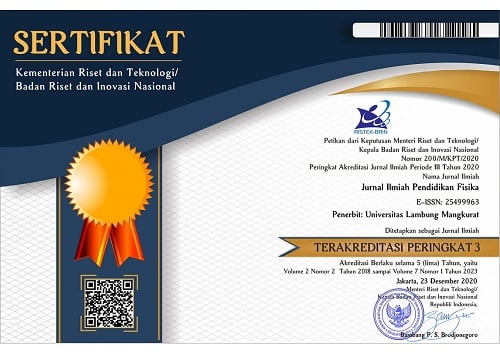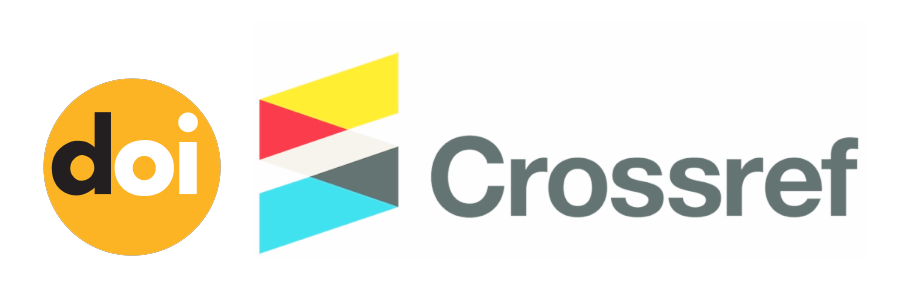STEM-Based Science E-Module: Is It Effective to Improve Students' Creative Thinking Skills?
Abstract
Elementary school students need to be able to think creatively, especially when facing various obstacles in their future careers. Therefore, it is necessary to develop STEM-based e-modules that can improve the creative thinking skills of elementary school students. This study aimed to describe how well STEM-based e-modules improved students' creative thinking skills about electrical energy. The subjects of this study were 30 students in sixth grade in MIN 2 Pringsewu, using the learning achievement test as a research instrument. Descriptive qualitative was used as the data analysis. The N-gain test was also used to evaluate the data. Based on the study's results, the electronic module was declared effective with an N-gain score of 0.7, which was determined from data analysis. Thus, it is assumed that e-modules based on the STEM approach were claimed to be able to develop students' creative thinking abilities further.
Keywords
Full Text:
PDFReferences
Adlim, M., Saminan, & Ariestia, S. (2015). Pengembangan modul stem terintegrasi untuk meningkatkan keterampilan proses sains. Jurnal Pendidikan Sains Indonesia, 03(02), 112–121.
Agung, I. D. G., Suardana, I. N., & Rapi, N. K. (2022). E-Modul IPA dengan Model STEM-PjBL Berorientasi Pendidikan Karakter untuk Meningkatkan Hasil Belajar Siswa. Jurnal Imiah Pendidikan Dan Pembelajaran, 6(1), 120. https://doi.org/10.23887/jipp.v6i1.42657
Agus, I. G., Prasetya, S., & Wirawan, I. M. A. (2017). Pengembangan E-Modul Pada Mata Pelajaran Pemodelan Perangkat Lunak Kelas Xi Dengan Model Problem Based Learning Di SMK Negeri 2 Tabanan. Jurnal Pendidikan Teknologi Dan Kejuruan, 14(1), 96–104.
Anggereini, E., Siburian, J., & Hamidah, A. (2023). Identification of project based learning and STEM PjBL innovation based on socio scientific issues as an effort to improve students’ scientific literacy. Jurnal Pendidikan Sains Indonesia, 11(1), 165–177. https://doi.org/10.24815/jpsi.v11i1.26927
Chen, Y., So, W. W. M., Zhu, J., & Chiu, S. W. K. (2024). STEM learning opportunities and career aspirations: the interactive effect of students’ self-concept and perceptions of STEM professionals. International Journal of STEM Education, 11(1), 1–21. https://doi.org/10.1186/s40594-024-00466-7
Costello, R. A., Salehi, S., Ballen, C. J., & Burkholder, E. (2023). Pathways of opportunity in STEM: comparative investigation of degree attainment across different demographic groups at a large research institution. International Journal of STEM Education, 10(1). https://doi.org/10.1186/s40594-023-00436-5
Destiyana, R. (2016). Pengembangan E-modul ipa terpadu berbasis flipbook maker tema pencemaran lingkungan sebagai sumber belajar mandiri siswa kelas vii smp/mt. (Doctoral dissertation, UIN Sunan Kalijaga Yogyakarta)
Desyandri, D., Muhammadi, M., Mansurdin, M., & Fahmi, R. (2019). Development of integrated thematic teaching material used discovery learning model in grade V elementary school. Jurnal Konseling Dan Pendidikan, 7(1), 16–22. https://doi.org/10.29210/129400
Diansah, I., & Asyhari, A. (2020a). Effectiveness of physics electronic modules based on Self Directed Learning Model (SDL) towards the understanding of dynamic fluid concept. Journal of Physics: Conference Series, 1572(1), 1–10. https://doi.org/10.1088/1742-6596/1572/1/012024
Diansah, I., & Asyhari, A. (2020b). Effectiveness of physics electronic modules based on Self Directed Learning Model (SDL) towards the understanding of dynamic fluid concept. Journal of Physics: Conference Series, 1572(1). https://doi.org/10.1088/1742-6596/1572/1/012024
Fatonah, S., & Yunianto, T. (2021). The development of professional flip pdf based learning media in thematic learning at the grade students of elementary school. Lentera Pendidikan, 24(1), 158–168.
Feola, S., Lewis, J. E., McAlpin, J. D., Prevost, L. B., Skvoretz, J., Stains, M., Couch, B. A., Earl, B., Ziker, J. P., Lane, A. K., & Shadle, S. E. (2023). STEM education institutional change projects: examining enacted approaches through the lens of the Four Categories of Change Strategies Model. International Journal of STEM Education, 10(1). https://doi.org/10.1186/s40594-023-00458-z
Gui, Y., Cai, Z., Yang, Y., Kong, L., Fan, X., & Tai, R. H. (2023). Effectiveness of digital educational game and game design in STEM learning: a meta-analytic review. International Journal of STEM Education, 10(1). https://doi.org/10.1186/s40594-023-00424-9
Gustiani, I., Widodo, A., & Suwarma, I. R. (2017). Development and validation of science , technology , engineering and mathematics ( STEM ) based instructional material Development and Validation of Science , Technology , Engineering and Mathematics ( STEM ) based Instructional Material. AIP Conference Proceedings 1848, 060001(May), 060001-1-060001–060007.
https://doi.org/10.1063/1.4983969
Hallström, J., Norström, P., & Schönborn, K. J. (2023). Authentic STEM education through modelling: an international Delphi study. International Journal of STEM Education, 10(1). https://doi.org/10.1186/s40594-023-00453-4
Hammack, R., Yeter, I., Pavlovich, C., & Boz, T. (2024). Pre-service elementary teachers’ science and engineering teaching self-efficacy and outcome expectancy: exploring the impacts of efficacy source experiences through varying course modalities. International Journal of STEM Education, 11(1). https://doi.org/10.1186/s40594-024-00464-9
Hartini, S., Firdausi, S., Misbah, & Sulaeman, N. F. (2018). The development of physics teaching materials based on local wisdom to train Saraba Kawa characters. Jurnal Pendidikan IPA Indonesia, 7(2), 130–137. https://doi.org/10.15294/jpii.v7i2.14249
Hartini, S., Mariani, I., & Sulaeman, N. F. (2020). Developing of students worksheets through STEM approach to train critical thinking skills. In Journal of Physics: Conference Series,1567(4), 042029. IOP Publishing.
Herak, R., & Lamanepa, G. H. (2019). Meningkatkan kreatifitas siswa melalui STEM dalam pembelajaran ipa increasing student creativity through STEM in science learning. Jurnal EduMatSains, 4(1), 89–98.
Hidayah, N., Komikesari, H., Pratiwi, W. O., Asiah, N., Asyhari, A., & Yusandika, A. D. (2023). STEM-based science e-module: is it sufficient to improve students’ creative thinking skills? Young Scholar Symposium on Science and Mathematics Education, and Environment, 040016(August 2020). https://doi.org/https://doi.org/10.1063/5.0124234
Hidayah, N., Masykuri, M., & Ramli, M. (2023). Effect of enviromental pollution e-module STEM based (science technology engineering and mathematics) to improve student’s inquiry skills. Jurnal Penelitian Pendidikan IPA, 9(3), 1099–1106.
https://doi.org/10.29303/jppipa.v9i3.2605
Irwandani, I., Latifah, S., Asyhari, A., Muzannur, M., & Widayanti, W. (2017). Modul digital interaktif berbasis articulate studio’13: pengembangan pada materi gerak melingkar kelas x. Jurnal Ilmiah Pendidikan Fisika Al-Biruni, 6(2), 221–231. https://doi.org/10.24042/jipfalbiruni.v6i2.1862
Lestari, D. A. B., Astuti, B., & Darsono, T. (2018). Implementasi lks dengan pendekatan stem (science, technology, engineering, and mathematics) untuk meningkatkan kemampuan berpikir kritis siswa. Journal Pendidikan Fisika Dan Teknologi, 4(2), 202–207.
Li, Y. (2023). Nine years of development in establishing the journal as a learning and research hub in STEM education. International Journal of STEM Education, 10(1). https://doi.org/10.1186/s40594-023-00459-y
Maric, D., Fore, G. A., Nyarko, S. C., & Varma-Nelson, P. (2023). Measurement in STEM education research: a systematic literature review of trends in the psychometric evidence of scales. International Journal of STEM Education, 10(1). https://doi.org/10.1186/s40594-023-00430-x
Meishanti, O. P. Y., & Maknun, M. J. (2022). STEM-based e-module (science technology engineering and mathematics) on class xi respiratory system materials. Journal Of Biology Education, 5(2), 145. https://doi.org/10.21043/jobe.v5i2.10787
Misbah, M., Khairunnisa, Y., Amrita, P. D., Dewantara, D., Mahtari, S., Syahidi, K., ... & Deta, U. A. (2021). The effectiveness of introduction to nuclear physics e-module as a teaching material during covid-19 pandemic. In Journal of Physics: Conference Series (Vol. 1760, No. 1, p. 012052). IOP Publishing.
Muallimuna. (2017). Penerapan pendekatan inkuiri pada mata pelajaran IPA untuk mengembangkan karakter siswa di SDN 01 Kota Bangun. Jurnal Madrasah Ibtidaiyah, 3(1), 28–47.
Muslem, M., Hasan, M., & Safitri, R. (2019). Pengembangan lembar kerja peserta didik berbasis problem based learning pada materi fluida statis. Edu Sains Jurnal Pendidikan Sains & Matematika, 7(1), 28–34. https://doi.org/10.23971/eds.v7i1.1111
Novelia, F., Raihanati, R., … R. F.-N. F. (E, & 2022, U. (2022). Pengembangan e-modul fisika dengan pendekatan science, technology, engineering, mathematic (stem) berbasis project based learning. Prosiding Seminar Nasional Fisika (E-Journal) SNF 2022, X, 51–56.
http://journal.unj.ac.id/unj/index.php/prosidingsnf/article/view/2440
Nurramadhani, A., Lathifah, S. S., & Permana, I. (2020). Students’ generated questions quality by developing stem-based e-module in science learning. Scientiae Educatia, 9(2), 134. https://doi.org/10.24235/sc.educatia.v9i2.7131
Prasetyo, D., Marianti, A., & Alimah, S. (2021). Improvement of students’ science literacy skills using stem-based e-modules. Journal of Innovative Science Education, 10(2), 216–221. http://journal.unnes.ac.id/sju/index.php/jise
Priyanthi, K. A., ., Dr. Ketut Agustini, S.Si, M. S., & ., Gede Saindra Santyadiputra, S.T., M. C. (2017). Pengembangan e-modul berbantuan simulasi berorientasi pemecahan masalah pada mata pelajaran komunikasi data (studi kasus : siswa kelas xi tkj smk negeri 3 singaraja). Kumpulan Artikel Mahasiswa Pendidikan Teknik Informatika (KARMAPATI), 6(1), 40–49. https://doi.org/10.23887/karmapati.v6i1.9267
Salampessy, Y. M., & Suparrman. (2019). Analisis kebutuhan e-modul berbasis pbl berpendekatan stem. Prosding Sendika, 5(1), 13–17.
Saputri, D. F., Wahyudi, W., Nurhayati, N., Nurussaniah, N., & Misbah, M. (2023). Development of electronic modules based on science, technology, engineering and mathematical (stem) approaches in vibration and wave courses. Jurnal Pendidikan Fisika dan Keilmuan (JPFK), 9(1), 53-65.
Sari, I. A. D., Ambarita, A., & Darsono, D. (2017). Pengembangan LKPD berbasis pbl untuk meningkatkan kemampuan berpikir kritis pada pembelajaran tematik kelas iv sekolah dasar. Jurnal Pendidikan Dasar, 1, 1–14.
Setiawan, B., Innatesari, D. K., Sabtiawan, W. B., & Sudarmin, S. (2017). The development of local wisdom-based natural science module to improve science literation of students. Jurnal Pendidikan IPA Indonesia, 6(1), 49–54. https://doi.org/10.15294/jpii.v6i1.9595
Setiyadi, M. W., Ismail, & Gani, H. A. (2017). Pengembangan modul pembelajaran biologi berbasis pendekatan saintifik untuk meningkatkan hasil belajar siswa. Journal of Educational Science and Technology (EST), 3(2), 102–112. https://doi.org/10.26858/est.v3i2.3468
Setyowati, R., & Fimansyah, W. (2018). Upaya peningkatan citra pembelajaran ips bermakna di indonesia. Jurnal PIPSI (Jurnal Pendidikan IPS Indonesia), 3(1), 14. https://doi.org/10.26737/jpipsi.v3i1.544
Sugiyono. (2020). Buku metode penelitian kualitatif & kuantitatif (Issue March).
Syukri, M., Yanti, D. A., Mahzum, E., & Hamid, A. (2021). Development of a PjBL model learning program plan based on a STEM approach to improve students’ science process skills. Jurnal Penelitian Pendidikan IPA, 7(2), 269. https://doi.org/10.29303/jppipa.v7i2.680
Tjiptiany, E. novita, As’ari, A., & Muksar, M. (2016). Pengembangan modul pembelajaran matematika dengan pendekatan inkuiri untuk membantu siswa sma kelas x dalam memahami materi peluang. Jurnal Pendidikan: Teori, Penelitian, Dan Pengembangan, 1(10), 1938–1942. https://doi.org/10.17977/jp.v1i10.6973
Tohir, M. (2019). Hasil PISA indonesia tahun 2018 turun dibanding tahun 2015. Paper of Matematohir, 2(1), 1–2. https://matematohir.wordpress.com/2019/12/03/hasil-pisa-indonesia-tahun-2018-turun-dibanding-tahun-2015/
Tohir, M. (2021). Hasil PISA indonesia tahun 2018 turun dibanding tahun 2015. 2(3), 274–281.
Widiawati, R., Virman, V., & Siallagan, J. (2022). Development of stem-pjbl integrated physics module (science, technology, engineering, and mathematics–project based learning) in direct current electricity materials to improve learning outcomes. Jurnal Ilmu Pendidikan Indonesia, 10(1), 34–42. https://doi.org/10.31957/jipi.v10i1.1932
Wu, J., Cropps, T., Phillips, C. M. L., Boyle, S., & Pearson, Y. E. (2023). Applicant qualifications and characteristics in STEM faculty hiring: an analysis of faculty and administrator perspectives. International Journal of STEM Education, 10(1). https://doi.org/10.1186/s40594-023-00431-w
Yunni, A. (2015). Pengembangan e-modul pada mata pelajaran dasar pengendalian mutu hasil pertanian dan perikanan kelas x tphp di smkn 1 cidaun.
Zakiyah, N. A., & Sudarmin. (2022). Development of E-Module STEM integrated ethnoscience to increase 21st century skills. International Journal of Active Learning, 7(1), 49–58. http://journal.unnes.ac.id/nju/index.php/ijal
Zhou, X., Shu, L., Xu, Z., & Padrón, Y. (2023). The effect of professional development on in-service STEM teachers’ self-efficacy: a meta-analysis of experimental studies. International Journal of STEM Education, 10(1). https://doi.org/10.1186/s40594-023-00422-x
DOI: https://doi.org/10.20527/jipf.v8i1.9042
Refbacks
- There are currently no refbacks.
Indexed by: Jurnal Ilmiah Pendidikan Fisika is licensed under a creative commons attribution-share alike 4.0 international license
Statistics Counter |
















